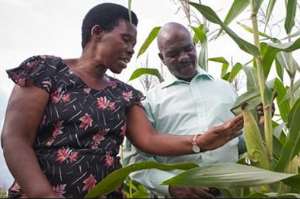
In sub-Saharan Africa, peasants excel in great numbers. Because each peasant lives in total solitude from the next neighborly peasant, they have no means of collectively coming together to become a force to be reckoned with in the political affairs of their constitutional governments. Meanwhile, the rent-seeking statesmen in the cities, who are far less copious numerically than the peasants, have the political clout to make their voice heard.
For the peasants to be effective drivers of economic developmental efforts, they ought to be given full throttle ownership of the land on which they farm; and that could be extended to banishing state-ownership, a dubious relationship which is seen time and time again as a major hindrance to the capital accumulation and entrepreneurial capacity building. Whenever political elites skew away the savings, garnered from doing transactions with the peasants, the peasants are in turn left with scant proceeds to innovate and expand their technical expertise.
Also, by becoming the sole owners of the land, they can prevent environmental degradation from soil erosion and the likes of deforestation. Vibrant financial establishments, free from the squalid influence of the ruling elites, need to be created to help further the provisions of research and expertise facilitation. International donor agencies could chip in once in a while to help protect peasants from further scavenging from the ruling statesmen. They could also lend their technical know-how to the peasantry communities until they have developed the entrepreneurial capacity to take a lead in spearheading their affairs.
South Africa is unique from their counterparts in sub-Saharan Africa in that the peasants do not make up the big chunk of its population. For that scenario alone, the ruling statesmen do not have the peasantry population to tamper with. Even if that were the case, their rights could have been protected by the constitution, a sagacious judiciary, and an independent mass media that acts as a fortification shell from unwarranted encroachment of the political elites.
All in all, the peasants in sub-Saharan Africa need a conducive bridging vehicle to the international markets, rather than constantly lay in wait to sell their hard-won products to the private-owned cooperatives of the ruling statesmen, which are the sole thieving culprits of their agricultural surpluses.
For democratization to become the launching pad, and thus, the guiding light of our progress and prosperity, it must be equitably extended to all the major actors involved, leaving no one untouched including the elite statesmen and the peasants themselves. Since the dawn of independence, our elite statesmen have been using the state power to live lavish lifestyles to the detriment of our poverty-stricken masses.
They saw climbing to the top tier of the political order as an easy route to wealth acquisition. Industrialization failed to take a quantum leap largely because they were laying in waste of melancholic stupor doing all sorts of unimaginable things: chief among them was heavy taxation; charging high energy bills; making it less likely for the private owners to innovate from the lack of accumulated capital.




 We’ll no longer tolerate your empty, unwarranted attacks – TUC blasts Prof Adei
We’ll no longer tolerate your empty, unwarranted attacks – TUC blasts Prof Adei
 Bawumia donates GHc200,000 to support Madina fire victims
Bawumia donates GHc200,000 to support Madina fire victims
 IMF to disburse US$360million third tranche to Ghana without creditors MoU
IMF to disburse US$360million third tranche to Ghana without creditors MoU
 Truck owner share insights into train collision incident
Truck owner share insights into train collision incident
 Paramount chief of Bassare Traditional Area passes on
Paramount chief of Bassare Traditional Area passes on
 Two teachers in court over alleged illegal possession of BECE papers
Two teachers in court over alleged illegal possession of BECE papers
 Sunyani: Victim allegedly shot by traditional warriors appeals for justice
Sunyani: Victim allegedly shot by traditional warriors appeals for justice
 Mahama vows to scrap teacher licensure exams, review Free SHS policy
Mahama vows to scrap teacher licensure exams, review Free SHS policy
 Government will replace burnt Madina shops with a new three-story, 120-store fac...
Government will replace burnt Madina shops with a new three-story, 120-store fac...
